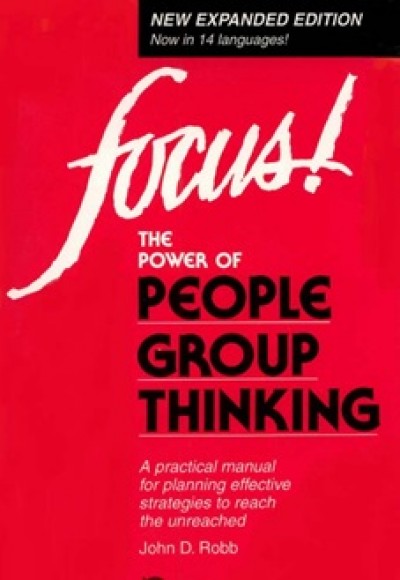Focus: The Power of People Group Thinking, a Practical Resource for Reaching the Unreached
If you have a heart for prayer and mission for the fulfillment of the Great Commission, this book is written for you!
It has been put together for followers of Jesus who share His heartbeat for the peoples of the world. It is designed for you if you want to see His love, justice, and salvation begin to operate within a particular group of people for whom you are specially concerned.
If you are a missionary, an evangelist, a pastor, or a lay person who wants to better understand your target audience in order to have a greater impact, this book can help you. It will give you the tools to develop a ministry strategy that, coupled with Spirit-led prayer, will be relevant to the people you are trying to reach. Focus! will enable you to both pray and communicate the Gospel with new effectiveness and greater response. It will assist you to design ministry outreaches and programs that the Spirit of God can use to move a whole unreached group toward the salvation and social well-being He so deeply desires for them.
The author, John Robb, who serves as chairman of the IPC has devoted his life to both prayer and mission initiatives in more than 100 countries for over 50 years. Focus! went through three printings, was translated into over 20 languages, and has been used by many involved in cross-cultural missions around the world. Feel free to download it and also to share it with others who have an interest in making Christ known to those who still do not know Him.
Free Download available HERE
USA: Days of destruction
31 May 2019A cell phone tornado alert prompted Rich to take his 83-year-old mother toward the basement. They went down four steps when they heard a loud boom. His home was destroyed. Walls bent, doors tilted, roof gone. Another house crippled in a stretch of severe weather that has devastated communities from the Rocky Mountains to the Mid-Atlantic in recent weeks. Multiple tornadoes are destroying homes, downing power lines, uprooting trees; torrential rain is overflowing storm sewers and flooding rivers. Hundreds are injured and the death toll is rising. In the Columbia area alone last week, tornadoes caused over seven deaths and scores of injuries. National Federal weather forecasters logged 500+ tornadoes in 30 days. On the East Coast, tornado and severe thunderstorm warnings were issued in northern New Jersey and New York. Forecasters said the briefest of reprieves might not come until 1 June, saying, ‘We are in uncharted territory.’ See https://www.telegraph.co.uk/news/2019/05/29/us-reels-serious-series-tornadoes-40-years/
Japan: Mediator for USA/Iran, USA/North Korea
31 May 2019During Donald Trump’s state visit to Japan he told Emperor Naruhito that he would support Prime Minister Shinzo Abe’s efforts to act as a mediator between the US and Iran. Abe will visit Tehran next month for talks with the President, Hassan Rouhani. Trump also gave his backing to Abe’s attempts to set up a first summit, without preconditions, with the North Korean leader Kim Jong-un, hours after the regime described his national security adviser, John Bolton, as a ‘warmonger’. Currently Tehran has no interest in talking to the US administration and last week sent 1,500 troops to the region. Trump wants Iran to have no nuclear weapons. Trump’s conciliatory tone extended to North Korea, despite deadlocked denuclearisation talks and Pyongyang’s recent testing of short-range missiles. He said his relationship with Kim was one of ‘great respect’, and talked up the prospects for progress on dismantling North Korea’s nuclear weapons programme.
Syria: Another wave of conflict
31 May 2019Over 40 civilians killed on 28 May were the latest casualties from barrel bomb bombardments in northwest Syria that have damaged schools and hospitals. Families are dying from government fire on towns in Idlib and the Aleppo countryside which is under the control of jihadi group Hayat Tahrir al-Sham. The region is supposed to be protected from government offensives by a buffer zone deal, but the area has come under increasing bombardment by the regime and Russia since late April. 260+ civilians have been killed in the spike in violence since then. The UN said that over 200,000 civilians have already been displaced by the recent upsurge of violence and an all-out offensive on the region would lead to a humanitarian catastrophe for its nearly 3 million residents. Over 20 health facilities have been hit by the escalation. Nineteen remain out of service.
Australia: Religious freedom
31 May 2019The Australian Christian Lobby is raising the profile of the need to protect religious freedom. They are stating that for some time now, the threat to religious freedom in Australia has not been merely a threat, but a reality and Australians now live in a country where religious freedom isn’t guaranteed. Countless court cases and new laws have already prevented Christians from living out and sharing their faith – and the cost is great. Loss of religious freedom paves the way for loss of other freedoms, and also restricts Australian Christians from sharing their faith with others. Pray for the voice of the Christian Lobby to be heard by the Governor-General, and in the Senate and the House of Representatives, and for those in society who are doing and thinking wrongly to be changed.
Israel: New election on 17 September
31 May 2019Former defence minister Avigdor Liberman whose party draws support from Israel’s largely secular Russian immigrant community, refused to join the government unless a military draft bill, crafted in the last Knesset, would be passed unaltered. The ultra-Orthodox parties dismissed this outright. Netanyahu needed 61 seats to form a governing coalition, but disagreements between secular and Halachic parties meant he was five seats short to form a coalition government by a 30 May deadline. A Halachic party is founded on Jewish law based on the Talmud, which is law passed down orally, not written. The deadline has passed, so the State of Israel is going to the elections again. In his comments following the dissolution, Netanyahu declared that Likud ‘will run a sharp and clear election campaign, and we will win.’
Japan: Catholic school pupils attacked
31 May 2019A man screaming ‘I will kill you’ and carrying a knife in each hand attacked Catholic schoolgirls waiting at a bus stop in Kawasaki, slaughtering two and wounding 16 others. He then stabbed himself in the throat and died. Most of the victims attended a private school founded by Soeurs de la Charité de Québec, an organisation of Catholic nuns in Quebec City in Canada. Japanese Prime Minister Shinzo Abe said, ‘It was an extremely harrowing incident in which many small children were victimised, and I feel strong resentment. I will take all possible measures to protect the safety of children.’ Japan has one of the lowest crime rates in the world.
Pakistan: Christian brick-kiln workers
31 May 2019Over the years Prayer-Alert has highlighted the plight of Brick-Kiln Workers; but it still goes on. Amanat worked seven days a week in a brick-kiln making 1,000 bricks daily, earning the equivalent of £4.20 that he never saw because it went back to the brick-kiln owner, paying interest on a loan he took out at a time of family crisis. His situation was hopeless. He had to borrow further money to buy food for his children. There are thousands of Pakistani Christian brick-kiln workers like him with debts keeping them bonded to their boss, unable to leave and get another job. Their wage just pays off interest on an impossible debt. They are despised, despairing and trapped bonded slaves. But Amanat got lucky. Barnabas Fund paid off his debt and with nothing being deducted from his wages any more, he can pay for his children’s schooling, or learn a new trade.







